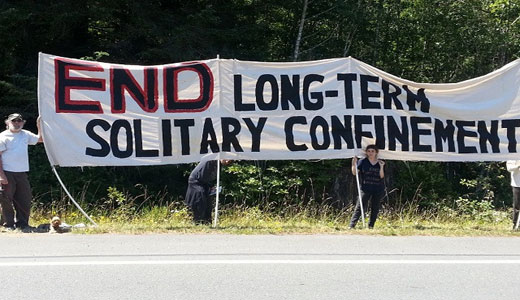
As a hunger strike by California prison inmates entered its seventh week Aug. 19, authorities said some 130 inmates in six prisons are refusing meals, with nearly 70 having maintained their strike from the start. Advocacy groups say they think far more inmates are participating.
When the strike started July 8, some 30,000 inmates, or more than one-fifth of the total prison population, were refusing meals at 22 of the state’s 33 prisons.
More than 3,600 inmates are reportedly held in isolation in “security housing units” (or SHUs) at four California prisons – for a fixed term or indefinitely – with dozens isolated for more than two decades. Authorities claim most are members or “associates” of prison gangs.
The strikers say such prolonged isolation amounts to torture, a contention supported by UN Special Rapporteur on Torture, Juan Mendez, who said in October 2011 that such confinement could amount to torture.
Strikers’ core demands include ending group punishment, changing how inmates are determined to be gang members or “associates,” ending long-term solitary confinement, providing enough nutritious food, and offering more constructive programs and activities for SHU inmates.
Governor Jerry Brown has been silent on the strike. A team of inmate advocates seeking to mediate the conflict says the California Department of Corrections and Rehabilitation (CDCR) is not negotiating with them, and a department spokesperson has said CDCR will not make policy decisions under “threats or intimidation.”
Many solidarity actions have been held around the state.
On Aug. 9 clergy and other strike supporters rallied in Los Angeles.
On July 30 nearly 100 family members of hunger strikers gathered in the state capitol, Sacramento, to present over 60,000 signatures to the governor’s office, demanding negotiations with the strikers.
Rallies have also been held in San Diego, San Jose and outside San Quentin State Prison in San Rafael. At a rally in Oakland, seven protesters locked themselves to the main entrance of the state office building, where they were arrested and later released.
In an Aug. 1 statement, Assemblyman Tom Ammiano, D-San Francisco, who chairs the Assembly’s Public Safety Committee, said of the inmates’ demands: “To keep anyone in severe isolation for indefinite amounts of time does not meet norms of human rights that civilized countries accept.” Ammiano and other legislative leaders have repeatedly urged that inmates’ basic human rights be respected.
A controversy erupted after CDCR head Jeffrey Beard, in an attempt to counter public support for the strikers, issued a statement Aug. 6 calling inmate strike leaders “leaders in four of the most violent and influential prison gangs in California… convicted murderers who are putting lives at risk to advance their own agenda of violence.”
He claimed former gang members had said in court declarations that the strike’s true aim was to “get out of the SHU to further our gang agenda” in the general population.
Among many who responded to Beard’s characterization was civil rights and inmates’ rights leader Angela Davis, who called the strike “a courageous call for the California prison system to come out of the shadows and join a world in which the rights and dignity of every person is respected.”
This week prison officials received authority from U.S. District Judge Thelton Henderson to force-feed inmates whose health is failing, even if they have a legally valid do-not-resuscitate (DNR) request.
The authority was requested by prison officials, a federal receiver controlling inmate medical care, and the Prison Law Office, a nonprofit advocating for prisoners’ welfare.
Prison policy has been that inmates may continue to refuse food if they have signed legally binding DNR requests, but Judge Henderson’s order would allow prison authorities to feed inmates who recently filed DNR requests or those thought to have been coerced into doing so.
In recent weeks dozens of strikers have sought medical help and several have been hospitalized. At the same time, legal advocates have continued to receive reports of ill treatment and indifference from both guards and prison medical personnel.
Photo: AP/California Department of Corrections












Comments